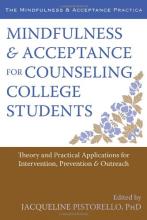
Pistorello, J. (Ed.). (2013). Mindfulness and Acceptance for Counseling College Students: Theory and Practical Applications for Intervention, Prevention, and Outreach. Oakland, CA: Context Press.
The college years are very stressful for many people, so it comes as little surprise that college-aged youth often suffer from diagnosable psychiatric disorders. Even among college students whose distress is not clinically diagnosable, the college years are fraught with developmental challenges that can trigger bouts of psychological suffering. Is it any wonder, then, that suicide is the second leading cause of death in this age group?
In Mindfulness and Acceptance for Counseling College Students, clinical researcher Jacqueline Pistorello explores how mindfulness and acceptance-based approaches such as acceptance and commitment therapy (ACT), dialectical behavioral therapy (DBT), mindfulness-based cognitive therapy (MBCT), and mindfulness-based stress reduction (MBSR) are being utilized in higher education settings around the world to treat student mental health problems like severe depression, substance abuse, and eating disorders, and/or to help students thrive--both in and out of the classroom.
This book offers easy-to-use programs for college counselors, therapists, instructors, administrators, and even high school counselors who are looking for tools to help high school students prepare for the transition to college. Counselors with extensive experience with mindfulness and acceptance approaches can learn new ways of adapting these approaches to interventions with college students, and counselors interested in these approaches but lacking experience can learn about these effective therapies. Finally, college administrators and staff can gain ideas for implementing mindfulness practices in various campus contexts to help promote student mental health or academic engagement.
In addition to chapters by Steven C. Hayes, the founder of acceptance and commitment therapy, this book also contains an online Appendix with helpful original handouts, Power Point slides, and links to podcasts and lectures to help implement mindfulness-based approaches on different campuses. It is a wonderful resource for any professional who works with college students and who is interested in promoting psychological well-being.
